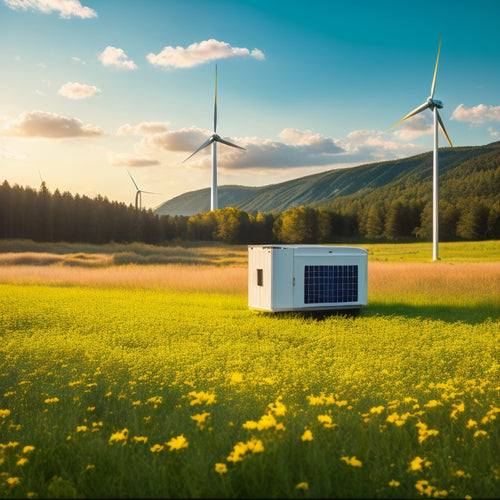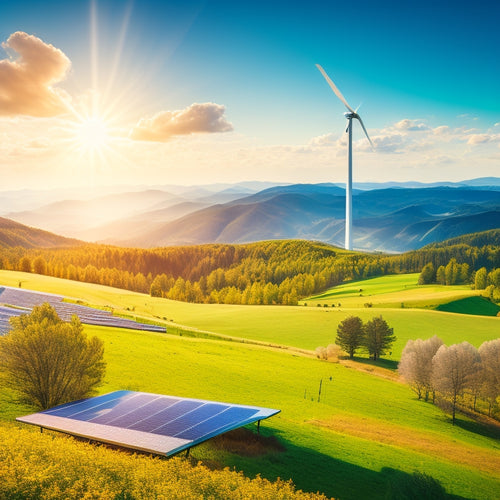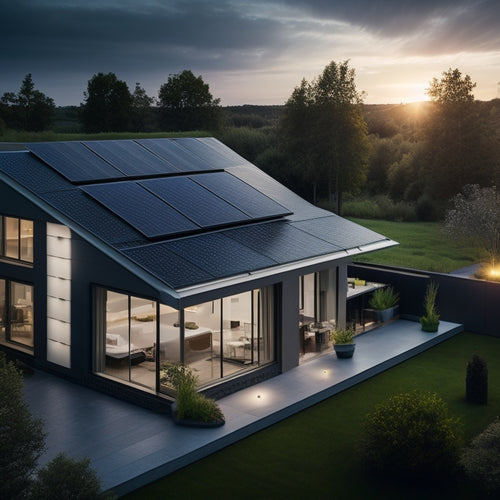
Solar Energy Storage Options
Share
You're looking for ways to utilize the full potential of solar energy with advanced storage options. You've come to the right place! With solar energy storage, you can control your power usage and costs, store excess energy for later use, and reduce your reliance on the grid. High-capacity lithium-ion batteries offer significant energy density advantages, while modular designs allow for easy scaling and flexible configuration. By evaluating your energy demands and usage patterns, you can optimize your energy consumption and minimize waste. From renewable energy independence to waste reduction methods, there's more to investigate in the world of solar energy storage - and you're just getting started.
The Essentials
- High-capacity lithium-ion batteries provide significant energy density advantages for solar energy storage, ideal for large-scale solar installations.
- Scalable and modular power solutions allow for easy scaling of battery systems to meet varying energy needs and provide enhanced performance.
- Assessing energy demands and usage patterns is crucial for selecting the right storage solutions, ensuring reliable power supply during outages and reducing electricity bills.
- Lower self-discharge rate in energy storage systems minimizes capacity loss over time, retaining stored energy and reducing power outage likelihood.
- Integration of smart grid technologies and energy-efficient appliances optimizes energy production, reducing waste and enhancing overall energy independence.
Renewable Energy Independence Guaranteed
You're about to experience energy on your terms, where you're in control of your power usage and costs.
With the ability to optimize your energy consumption and reduce your reliance on the grid, you'll be able to maximize your solar panel investment and guarantee a consistent and reliable energy supply.
By storing excess energy generated during the day, you'll be shielded from fluctuating energy prices and outages, assuring a seamless and efficient experience.
You'll have the ability to store excess energy generated by your solar panels during the day and use it when you need it, reducing your reliance on the grid.
This means you'll be shielded from fluctuating energy prices and outages, guaranteeing a consistent and reliable energy supply.
Energy On Your Terms
With renewable energy systems, homeowners and businesses can break free from the grid's constraints, securing a reliable and sustainable supply of power.
You're no longer tied to the whims of utility companies or vulnerable to outages. Instead, you're in control, with the ability to generate and store energy on your own terms.
By integrating home battery storage systems, you can solve three major problems: reduce your reliance on the grid during power outages, lower your electricity bills, and shave peak demand charges.
This energy flexibility allows you to optimize your power usage, using excess energy generated during the day to fuel your nighttime needs. You can also store excess energy for later use, reducing your reliance on the grid and minimizing your energy bills.
Power optimization becomes a reality, as you're able to tailor your energy usage to your specific needs.
Grid Freedom Now
Every day, hundreds of homeowners and businesses are breaking free from the grid's constraints, securing a reliable and sustainable supply of power through renewable energy systems. You can join them, achieving true energy independence with off-grid systems that utilize the power of the sun. By combining solar energy generation with advanced battery technologies, you can break free from the grid's limitations and enjoy a consistent, reliable supply of clean energy.
| Off-Grid System Component | Description |
|---|---|
| Solar Panels | Convert sunlight into electrical energy |
| Battery Bank | Store excess energy for later use |
| Inverter/Converter | Manage energy flow between solar, battery, and load |
With a well-designed off-grid system, you'll enjoy the freedom to live or work wherever you choose, without reliance on the grid. No more worrying about power outages or rate hikes – you'll be in control of your energy destiny. By choosing the right battery technologies and system design, you can guarantee a reliable and efficient supply of power, whenever and wherever you need it.
Zero Energy Waste Guarantee
When you opt for a zero energy waste guarantee, you'll want to investigate waste reduction methods that maximize energy efficiency.
You'll need to take into account energy efficiency standards that guarantee your solar energy storage system is optimized to minimize waste.
A well-designed residential energy storage system, which includes solar panels, batteries, charging units, electrical inverters, and energy management systems, can greatly reduce energy waste.
For instance, a home energy storage system can store excess energy from your solar panels to use during outages and off-peak hours.
Waste Reduction Methods
Implementing waste reduction methods is essential to achieving the Zero Energy Waste Guarantee in solar energy storage systems.
As you investigate ways to minimize waste, consider incorporating recycling programs for materials like batteries and solar panels. You can also implement upcycling initiatives that convert discarded materials into new products, reducing the need for raw resources.
Composting strategies can help divert organic waste from landfills, while waste-to-energy conversion can generate electricity from non-recyclable materials.
When selecting materials, opt for biodegradable options and eco-friendly packaging to minimize environmental impact. Resource conservation is key, so prioritize reducing, reusing, and recycling whenever possible.
By adopting landfill alternatives and embracing a circular economy, you'll be well on your way to achieving zero energy waste.
Energy Efficiency Standards
You've made substantial progress in minimizing waste by adopting sustainable practices in your solar energy storage system.
Now, it's crucial to focus on energy efficiency standards to guarantee a Zero Energy Waste Guarantee.
As you aim for energy independence, you must prioritize energy efficiency in your system's design and operation. This involves optimizing energy conversion, storage, and consumption. You can achieve this by selecting high-efficiency solar panels, inverters, and energy storage devices.
Additionally, implementing smart grid technologies and advanced weather forecasting can help you optimize energy production and consumption.
To secure zero energy waste, you must also consider the system's overall energy efficiency. This can be accomplished by implementing energy-efficient appliances, lighting, and HVAC systems in your building or home.
By doing so, you'll minimize energy waste and make certain that your solar energy storage system operates at peak efficiency.
High-Capacity Lithium-Ion Batteries
You're considering high-capacity lithium-ion batteries for solar energy storage because they offer significant energy density advantages.
This means you can store more energy per unit of battery weight and volume, making them ideal for large-scale solar installations.
For instance, top rated home solar battery systems like Tesla Powerwall and LG Chem best solar batteries can efficiently store excess energy generated by your solar panels during the day.
As you scale up your power solutions, these batteries can efficiently handle the increased energy demands.
Energy Density Advantages
Several high-capacity lithium-ion battery options boast impressive energy density advantages, making them ideal for solar energy storage.
You'll find that these batteries offer a higher energy density compared to other storage solutions, allowing for more efficient storage of solar energy. When it comes to energy density comparison, high-capacity lithium-ion batteries outperform traditional lead-acid batteries, making them a more viable option for solar energy storage.
The higher energy density of these batteries translates to improved storage efficiency.
You'll be able to store more energy per unit of weight and volume, reducing the overall size and weight of your solar energy storage system. This means you can store more solar energy in a smaller space, making it ideal for residential and commercial applications.
With high-capacity lithium-ion batteries, you can enjoy greater flexibility and freedom in your solar energy storage system design, allowing you to optimize your system for maximum efficiency and performance.
Scalable Power Solutions
Three key aspects of high-capacity lithium-ion batteries make them ideal scalable power solutions for solar energy storage: modular design, flexible configuration, and seamless integration.
As you investigate these features, you'll realize why they're perfect for storing excess energy generated by your solar panels. Modular systems allow you to scale up or down depending on your energy needs, ensuring you're not paying for capacity you don't use.
Flexible installations enable you to customize your storage setup to fit your unique space constraints and energy requirements.
When you integrate these batteries with your solar panel system, you'll experience a seamless shift between generating and storing energy. You can monitor and control your energy storage in real-time, making adjustments as needed to optimize your energy independence.
With high-capacity lithium-ion batteries, you'll have the freedom to store excess energy and use it when you need it most, reducing your reliance on the grid and saving you money on your energy bills.
Assess Your Energy Demands
You need to understand your energy usage patterns to determine the right solar energy storage solution for your needs.
To do this, you'll want to calculate your daily power requirements, including peak usage hours and total daily energy consumption. By analyzing these factors, you'll be able to specify the required capacity and performance of your energy storage system.
Consider investing in a reliable home energy storage system to guarantee a smooth power supply during outages.
Additionally, evaluating your energy demands will also help you reduce your electricity bills by optimizing your energy usage.
Energy Usage Patterns
Evaluating energy demands involves understanding one's energy usage patterns, which can vary greatly from one household to another.
You need to identify your peak demand periods, which typically occur during hot summer afternoons when air conditioning is in full swing. Conversely, off-peak usage times, such as late nights or early mornings, can help you optimize your energy consumption.
Seasonal variation also plays a significant role, as your energy needs change with the weather. By analyzing your consumption trends, you can make informed decisions about energy forecasting and usage optimization. This, in turn, can reduce your grid reliance and help you achieve greater efficiency.
Your user behavior, such as turning off lights or appliances when not in use, can also impact your overall energy demands. Efficiency tracking and demand response strategies can further help you refine your energy usage patterns.
Daily Power Requirements
Efficiency begins with a thorough understanding of daily power requirements, which serve as the foundation for accurately evaluating your energy demands. To assess your power needs, you'll need to calculate your daily energy consumption. This involves identifying the appliances and devices you use, their respective power ratings, and the number of hours you use them daily.
| Appliance/Device | Power Rating (Watts) | Daily Usage (Hours) |
|---|---|---|
| Refrigerator | 100 | 24 |
| TV | 50 | 4 |
| Laptop | 20 | 8 |
| Lighting | 10 | 8 |
| Fan | 50 | 6 |
Lower Self-Discharge Rate
When selecting a solar energy storage system, you'll want to take into account options with a lower self-discharge rate, which translates to a slower capacity loss over time.
This means you'll retain more of your stored energy when you need it, reducing the likelihood of power outages or brownouts.
With a lower self-discharge rate, you can guarantee a more reliable and efficient energy storage system that meets your needs.
Slower Capacity Loss
One essential advantage of solar energy storage systems is their slower capacity loss, which translates to a lower self-discharge rate. This means you'll enjoy a more consistent and reliable energy supply over time.
Slower capacity loss directly impacts your battery lifespan, as it reduces performance degradation. With a slower rate of capacity loss, your solar energy storage system will maintain its original capacity for a longer period, ensuring you get the most out of your investment.
When you choose a solar energy storage system with slower capacity loss, you'll experience fewer battery replacements and reduced maintenance costs over the system's lifespan. This is because the batteries will retain their ability to hold a charge and provide power efficiently, even after multiple charge and discharge cycles.
As a result, you'll enjoy a more sustainable and cost-effective energy solution that aligns with your goal of achieving energy independence. By understanding the significance of slower capacity loss, you can make informed decisions when selecting a solar energy storage system that meets your needs and helps you achieve your energy freedom goals.
Frequently Asked Questions
Can I Use Solar Energy Storage During Power Outages?
When the grid fails, you can maintain energy independence with solar energy storage, allowing you to thrive off-grid during power outages, ensuring your lights stay on and essential systems run smoothly, giving you freedom from utility reliance.
Are Solar Energy Storage Systems Environmentally Friendly?
You'll be interested to know that 95% of a lithium-ion battery's carbon footprint comes from production. As you consider solar energy storage, know that lifecycle assessments show they're environmentally friendly, and innovators are developing recycling options to minimize waste.
How Often Should I Maintain My Energy Storage System?
To maximize battery lifespan, you should establish and stick to regular maintenance schedules, checking electrolyte levels, terminals, and connections monthly, and performing deeper inspections quarterly, to guarantee peak performance and extend your system's overall lifespan.
Can I Use Solar Energy Storage for My RV or Boat?
As you hit the open road or set sail, you're free to roam with RV solar or boat batteries storing excess energy, powering your excursions, and giving you independence from the grid.
Are There Any Government Incentives for Energy Storage Systems?
You'll be glad to know that, yes, there are government incentives for energy storage systems! You can tap into federal tax credits, state rebates, energy storage loans, and performance incentives to offset your investment and maximize your freedom.
Final Thoughts
You've examined the world of solar energy storage options, ensuring renewable energy independence and minimizing waste. High-capacity lithium-ion batteries offer a reliable solution. By evaluating your energy demands, you can optimize your storage system. With lower self-discharge rates, you'll maximize your energy harvest. Did you know that the global energy storage market is projected to reach 1.2 terawatt-hours by 2030, a 1,500% increase from 2020? This growth highlights the importance of embracing solar energy storage solutions for a sustainable future.
Related Posts
-

Sustainable and Eco-Friendly Generators for a Reduced Carbon Footprint
Sustainable and eco-friendly generators are perfect for cutting your carbon footprint and increasing energy efficienc...
-

Renewable Energy Solutions to Reduce Your Carbon Footprint
To reduce your carbon footprint, adopting renewable energy solutions is key. Using solar panels or wind turbines can ...
-

Home Solar Battery
You're opting for a home solar battery that allows you to utilize the power of the sun during the day and use it at n...


